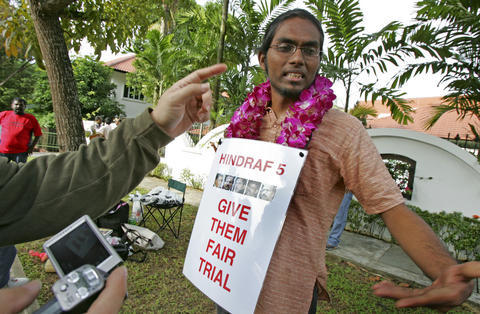A Singaporean artist calling for the release of five ethnic Indian activists detained in neighboring Malaysia ended his five-day hunger strike yesterday.
Seelan Palay, 23, had been camped outside the city-state's Malaysian High Commission since Monday, consuming nothing but water. Seelan, an ethnic Indian, was protesting the arrest and detention of leaders from the Hindu Rights Action Force who led a massive rally on Nov. 25 in Kuala Lumpur to highlight what the group says is racial discrimination faced by ethnic Indians.
The group's leaders were arrested last month under Malaysia's Internal Security Act, which allows indefinite detention without trial.

PHOTO: AP
Yesterday, a crowd of supporters gathered around Seelan and presented him with a garland that he wore around his neck over a placard that read: "Give them fair trial."
"What I have done is only what I can do as an individual. If we had a hundred, we could make a difference," Seelan said. "One day, we will all achieve freedom."
Seelan said he hoped his hunger strike would draw attention to the detentions.
"I hope that the international community, regardless of race and religion, to look into this issue and pressure the Malaysian government to release the Hindraf five," he said.
Two men hoisted Seelan up and pumped their fists in the air as Seelan completed his protest.
"We are so proud that there is at least one Indian in Singapore supporting our cause," said Mayil Sapapathy, 36, an ethnic Indian from Malaysia who works in Singapore. "Indians like us don't get the same privileges in Malaysia like the ethnic Malays do."
Ethnic Indians form about 8 percent of Malaysia's 27 million people, and complain that the government denies them opportunities in jobs, education and business. They say that years of systematic repression have kept them at the bottom of society.
The government denies this.
Officials could not be reached yesterday at the Malaysian High Commission, which was closed, while Singapore police said they had no comment on Seelan's protest.
Protests are rare in Singapore, where police permits are required for outdoor gatherings of more than four people.

The Ministry of Economic Affairs has fined Taobao NT$1.2 million (US$36,912) for advertisements that exceed its approved business scope, requiring the Chinese e-commerce platform to make corrections in the first half of this year or its license may be revoked. Lawmakers have called for stricter enforcement of Chinese e-commerce platforms and measures to prevent China from laundering its goods through Taiwan in response to US President Donald Trump’s heavy tariffs on China. The Legislative Yuan’s Finance Committee met today to discuss policies to prevent China from dumping goods in Taiwan, inviting government agencies to report. Democratic Progressive Party Legislator Kuo Kuo-wen (郭國文) said

The Ministry of Economic Affairs has fined Taobao NT$1.2 million (US$36,900) for advertisements that exceeded its approved business scope and ordered the Chinese e-commerce platform to make corrections in the first half of this year or its license would be revoked. Lawmakers have called for stricter supervision of Chinese e-commerce platforms and more stringent measures to prevent China from laundering its goods through Taiwan as US President Donald Trump’s administration cracks down on origin laundering. The legislature’s Finance Committee yesterday met to discuss policies to prevent China from dumping goods in Taiwan, inviting government agencies to report on the matter. Democratic Progressive Party

Taiwan and its Pacific ally Tuvalu on Tuesday signed two accords aimed at facilitating bilateral cooperation on labor affairs, according to Taiwan’s Ministry of Foreign Affairs (MOFA). The governments inked two agreements in Taipei, witnessed by Foreign Minister Lin Chia-lung (林佳龍) and visiting Deputy Tuvaluan Prime Minister Panapasi Nelesone, MOFA said in a news release. According to MOFA, the agreements will facilitate cooperation on labor issues and allow the two sides to mutually recognize seafarers’ certificates and related training. Taiwan would also continue to collaborate with Tuvalu across various fields to promote economic prosperity as well as the well-being of their

Sung Chien-liang (宋建樑), who led efforts to recall Democratic Progressive Party (DPP) Legislator Lee Kun-cheng (李坤城), was released on bail of NT$80,000 today amid outcry over his decision to wear a Nazi armband to questioning the night before. Sung arrived at the New Taipei District Prosecutors’ Office for questioning in a recall petition forgery case last night wearing a red armband bearing a swastika, carrying a copy of Adolf Hitler’s Mein Kampf and giving a Nazi salute. Sung left the building at 1:15am without the armband and covering the book with his coat. Lee said today that this is a serious